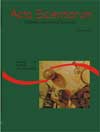Mirrors, identities: Brazil and its reflections
Abstract
Mirrors have been present in the cultural history of many peoples, and many times they have served to reflect on the identity, religious life or psychological life of these peoples. In Latin American literature, the constant presence of mirrors means that the search for identity, even so many years after the different countries have been established, is still an important issue. Using a statement by Bioy Casares, a character in Jorge Luis Borges's short story “Tlön, Uqbar, Orbis Tertius”, “mirrors and copulation are abominable,” as a frame, this discussion presents works by several Brazilian writers who have used the image of the mirror to discuss the identity of the country. Even though each writer, Machado de Assis, Guimarães Rosa, Roberto Drummond and Helena Parente Cunha, expresses the specific cultural anxiety of his or her time, it is always clear that the identity of the country is not a fixed recipe.Downloads
Download data is not yet available.
Published
2008-07-04
How to Cite
Bueno, E. P. (2008). Mirrors, identities: Brazil and its reflections. Acta Scientiarum. Human and Social Sciences, 20, 1-7. https://doi.org/10.4025/actascihumansoc.v20i0.4213
Issue
Section
Literature and Linguistics
DECLARATION OF ORIGINALITY AND COPYRIGHTS
I Declare that current article is original and has not been submitted for publication, in part or in whole, to any other national or international journal.
The copyrights belong exclusively to the authors. Published content is licensed under Creative Commons Attribution 4.0 (CC BY 4.0) guidelines, which allows sharing (copy and distribution of the material in any medium or format) and adaptation (remix, transform, and build upon the material) for any purpose, even commercially, under the terms of attribution.
Read this link for further information on how to use CC BY 4.0 properly.
























